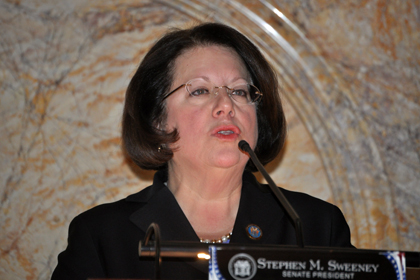
Legislation Would Stop Dangerous and Harassing Practice by Trucks of Releasing Excess Diesel Exhaust at Other Automobiles
TRENTON – A measure sponsored by Senator Linda R. Greenstein that would prohibit the dangerous act of “rolling coal” in New Jersey was approved today by the full Senate.
A recent YouTube sensation, “rolling coal” is the practice of intentionally releasing diesel exhaust into the air through smokestacks on diesel-powered trucks. A device on these modified vehicles tricks the engine into believing it needs more fuel than it can combust properly, releasing the excess as soot.
Coal rollers often aim their exhaust at Priuses or other clean cars as a political statement against the federal Environmental Protection Agency, environmentalists and President Obama.
“Individuals who coal roll are attempting to make a political statement at the expense of our air quality and our health, and it is absolutely ludicrous,” said Senator Greenstein, D-Middlesex and Mercer, and Vice Chairwoman of the Senate Environment and Energy Committee. “We have been working diligently to reverse years of pollution and emissions that have been pumped into our air, including removing cars that exceed national health standards from the road. ‘Rolling coal’ is not a harmless statement without any victims. Not only can it cause visual impairment of those in the victim’s car, but increased emissions like those released during ‘rolling coal’ can cause serious respiratory issues such as asthma. This must be stopped.”
The bill, S-2418, would prohibit drivers from purposely releasing significant quantities of soot, smoke or emissions into the air and onto roadways or other vehicles. Additionally, it would ban the retrofitting of any diesel-powered vehicle with a device, smoke stack or other equipment to allow for “rolling coal.”
Under the bill, anyone who violates this prohibition would be subject to the penalties of the Air Pollution Control Act, which include a fine up to $5,000 per violation.
The bill was approved by the Senate with a vote of 36-0. It now heads the General Assembly for further consideration.

